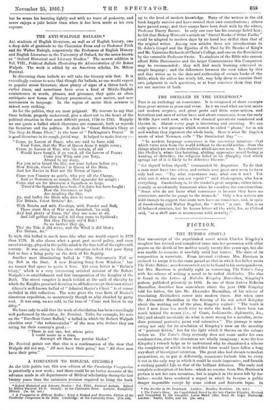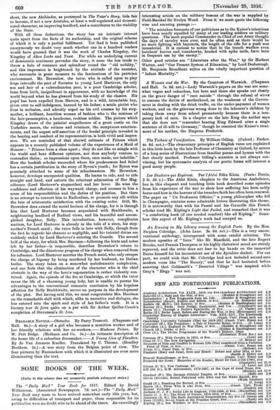FICTION.
THE TUTOR'S STORY.f
THE manuscript of the unpublished novel which Charles Kingsley's daughter has revised and completed came into her possession with other papers on the death of her mother nearly twenty-five years ago, but she was unable to examine it carefully until last winter. The date of its composition is uncertain. From internal evidence Mrs. Harrison is inclined to assign it the same period as that in which her father wrote The Water Babies ; no references to it are to be found in his correspondence, but Mrs. Harrison is probably right in connecting The Tutor's Story with his scheme of writing a novel to be called Alcibiades. The clue is found in the Leiters of Malcolm Kingsley Macmillan, Kingsley's godson, published privately in 1893. In one of these letters Malcolm Macmillan describes how somewhere about the year 1860 Kingsley told his father, the late Mr. Alexander Macmillan, of his scheme of translating Alcibiades's career into modern times. But when once Mr. Alexander Macmillan in the hearing of his son asked Kingsley about the working out of the plan, Kingsley replied : " The truth is that I now know too much ever to write the book, I have been tee much behind the scenes [i.e., of Court, fashionable, diplomatic, &c., life] and should inevitably do what is most wrong for a novelist, intro- duce personal portraits, paint real calamities." Tho passage is inter- esting not only for its revelation of Kingsley's view on the morality of " portrait fiction," but for the light which it throws on the volume before us. The Tutor's Story certainly does not come under his own condemnation, since the characters are wholly imaginary; none the less Kingsley's remark helps us to understand why he abandoned a scheme the completion of which in its modified form would have fallen a long way short of his original intention. The great idea had shrunk to modest proportions, or, to put it differently, conscience forbade him to carry it out in the only way in which it could be made impressive, and furnish a striking parallel Life to that of the brilliant Athenian. The early and complete redemption of his hero—which we assume from Mrs. Harrison's preface is not her own invention, but is implicit in the notes left by her father—would have rendered a sequel in which he became a publio danger impossible except by some violent and fantastic lapse.' In • The Dweller in the Innermost London : Headley Brothers. (2s. net.1 f The Tutor's Story. An Unpublished Novel by the late Charles Kingsley, Revised and Completed by his Daughter, Lucas /islet (Era. Mary St. Leger liarrlson). Landon : Smith, Elder, and Co. [lie. net.] short, the new Alcibiades, as portrayed in The Tutor's Story, bids fair to become, if not a new Aristides, at least a well-regulated and domesti- cated character, an improving landlord, and a contributor to the stability of the State.
With all these deductions, the story has an intrinsic interest quite apart from the facts of its authorship, and the original scheme of which it is only a partial fulfilment. Yet ihad it been published anonymously we doubt very much whether one in a hundred readers would have guessed That it was the work of Charles Kingsley, the Kingsley of Alton Locke and Yeast. For while an underlying current of democratic sentiment pervades the story, it none the less tends to throw a halo of romance and splendour round the " old nobility," and this impression is heightened by the attitude of the narrator, who succumbs in great measure to the fascinations of his patrician environment. Mr. Brownlow, the tutor, who is called upon to play Longo intervallo the part of Socrates to young Lord Hartover, the only son and heir of a valetudinarian peer, is a poor Cambridge scholar, lame from birth, insignificant in appearance, with no knowledge of the world beyond what he has gleaned from his study of the classics. His pupil has been expelled from Harrow, and is a wild, intractable boy, given over to self-indulgence, banned by his father, a senile pietist who lives in seclusion, and adroitly urged on his evil courses by his step- mother, a brilliant, heartless woman of fashion who is the mistress of the heir-presumptive, a handsome, reckless soldier. The picture which Kingsley draws of the palatial magnificence of a great castle on the Yorkshire moors, the retinue and retainers, the sumptuous entertain- ments, and the august self-assertion of the feudal principle revealed in the bearing and conduct of its representatives, is both vivid and impres- sive. We are reminded of that shrewd estimate of Princes which appears in a recently published volume of the experiences of a Maid of Honour : " Princes form a class apart ; they do not like us mingle with the world and hear different opinions, nor does anybody venture to contradict theirs ; so impressions upon them, once made, are indelible." How the bookish scholar succeeded where his predecessors had failed has a certain justification in the story of Byron's youth ; for Byron was genuinely attached to some of his schoolmasters. Mr. Brownlow, however, develops unexpected qualities. He learns to ride, and to ride straight and hard, and extorts the reluctant admiration of Her Mag- nificence (Lord Hartover's stepmother) and her lover. He wins the confidence and affection of his wayward charge, and arouses in him a sense of his responsibilities and the duties of his position. But there is no attempt to convert him to Radicalism, or promote any rift within the lute of aristocratic satisfaction with the existing order. Still, Mr. Brownlow does extend the social horizon of his charge, for it is through him that Lord Hartover becomes acquainted with Braithwaite, a neighbouring landlord of Radical views, and his beautiful and accom- plished daughter, Nelly. This introduction, however, complicates matters, for Lord Hartover is already in the toils of a siren, his step- mother's French maid ; the tutor falls in love with Nelly, though from the first he regards his chances as negligible, and his tutorial duties are suddenly ended by Lord Hartover's entering the Guards. The second half of the story, for which Mrs. Harrison—following the hints and notes left by her father—is responsible, describes Brownlow's return to Cambridge, and the disastrous progress of his charge when removed from his influence. Lord Hartover marries the French maid, who only escapes the charge of bigamy by being murdered by her husband, an Italian butler. The story takes on a somewhat melodramatic complexion, and one feels that the elimination of the character who is the chief obstacle in the way of the hero's regeneration is rather violently con- trived. Again, the episode of the fire at Cambridge, at which the tutor saves the life of a charming young lady, but is unable to pursue his advantages to the conventional romantic conclusion by his hopeless affection for Nelly Braithwaite, serves no purpose in the development of the plot. But having said this, we must congratulate Mrs. Harrison on the remarkable skill with which, alike in narrative and dialogue, she has entered into the spirit and style of her father's work. It is a literary tour de force quite on a par with Sir Arthur Quiller-Couch's completion of Stevenson's St. Ives.



































 Previous page
Previous page